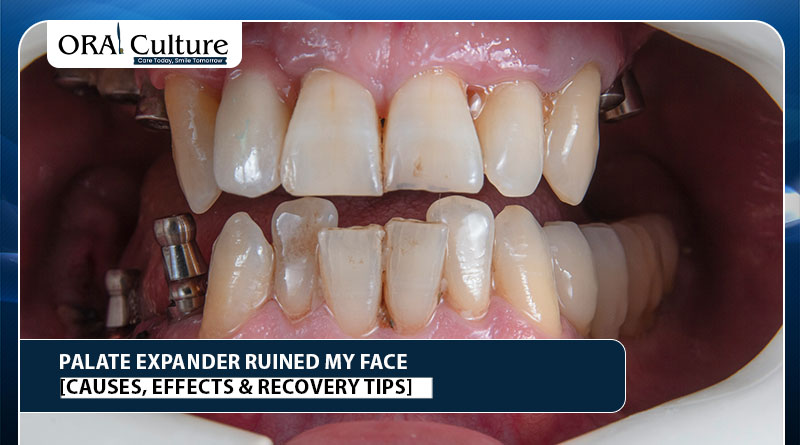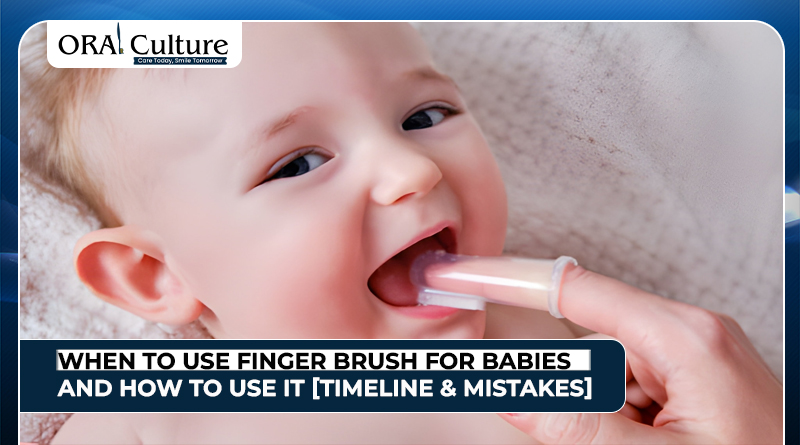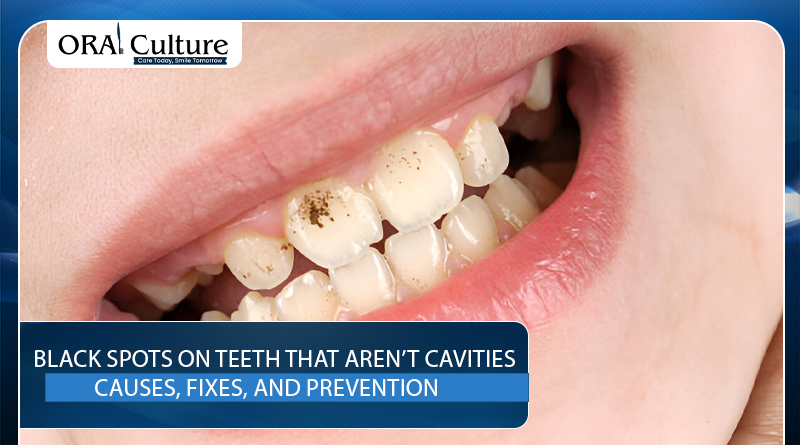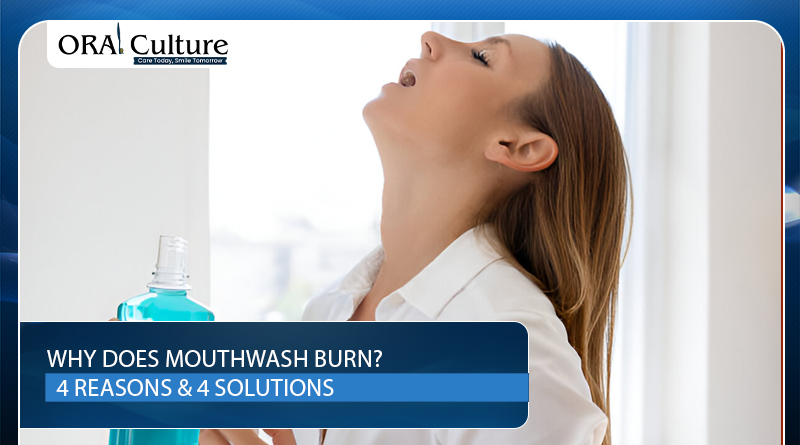Mouthwash burns the insides of your mouth due to its strong components which include alcohol, menthol, and aromatic oils. These create that tingling or burning feeling in your mouth. For some people, it’s just a light sensation. For others, it can feel too harsh.
Let’s break it down so you know exactly why that burning sensation after mouthwash happens and what you can do about it.
What Causes That Burning Sensation after Using Mouthwash?
There are a few main ingredients in mouthwash that lead to that burn. Some of them are meant to clean, kill bacteria, or freshen breath. However, they could also be irritating your mouth.
1. Alcohol
Alcohol is one of the leading reasons of the mouthwash burn. It’s often added to kill germs and act as a preservative. Some mouthwashes have up to 25% alcohol, that’s stronger than beer or wine.
While alcohol helps remove bacteria, it can also dry out your mouth and irritate soft tissues like your gums and cheeks. That’s why it burns, especially if you have cuts, ulcers, or sensitive spots in your mouth.
2. Menthol, Eucalyptol, and Thymol
These are essential oils found in many popular mouthwashes like Listerine. They give that cooling, minty effect. But in higher amounts, they can sting especially on an empty stomach or if you have brushed too hard.
3. Chlorhexidine
Some prescription mouthwashes contain this powerful antibacterial ingredient. This one is great for fighting gum infections but it can also cause irritation and a strong burning feeling in some users.
4. Sodium Lauryl Sulfate (SLS)
This is a foaming agent often found in toothpaste and sometimes in mouthwash. It can irritate the soft lining of the mouth which might make the burn worse.
Is Burning a Sign That It’s Working?
Not really. That’s a common myth.
Many people think if it burns, it must be killing bacteria and doing a deep clean. But that’s not always true. In fact, too much burning might mean it’s harming the healthy cells in your mouth or drying it out which can actually cause more problems like bad breath and infections.
So, a strong burn doesn’t always mean it’s better. Gentle can be just as effective.
Who Should Be Careful with Mouthwash?
Mouthwash is not a solution for all your dental problems. Here are some people who should use it with caution or skip it entirely:
People with Sensitive Mouths
If your mouth often feels sore, dry, or irritated, strong or alcohol-based mouthwashes can make things worse. These formulas may sting or cause inflammation, especially around the gums or cheeks.
Children
Dentists usually advise against giving alcohol-based mouthwash to children under 12. Young kids might accidentally swallow it, which can be harmful. It can cause nausea or even alcohol poisoning in severe scenarios.
People with Mouth Ulcers or Cuts
Have a canker sore, bitten cheek, or recent dental work? Mouthwash can burn when it touches open wounds which could make the healing process uncomfortable and possibly slower.
People with Dry Mouth (Xerostomia)
If your mouth feels dry, sticky, or you have trouble speaking or swallowing, you might have dry mouth. Alcohol-based rinses can worsen this by reducing saliva production even more, so it’s best to use hydrating, alcohol-free alternatives instead.
4 Safe Alternatives to Burning Mouthwash
You don’t need to suffer every time you rinse. There are plenty of gentler options out there:
Alcohol-Free Mouthwash
Many brands now offer mouthwash without alcohol. These still fight bacteria and freshen your breath but are much gentler in your mouth.
Look for labels that say: “Alcohol-Free”, “For Sensitive Mouths”, “Gentle Formula”
Saltwater Rinse
A homemade saltwater rinse is one of the best natural alternatives. It’s simple and soothing. Just mix 1 cup of warm water and ½ teaspoon of salt. Spend 30 seconds swishing it around your mouth.. It helps reduce swelling, kill germs, and soothe irritation without any burn.
Aloe Vera Mouth Rinse
Some people find relief using mouthwash made with aloe vera. It is well renowned for its calming and soothing qualities.
Fluoride Rinse
If you are rinsing mainly for cavity protection, a fluoride rinse may be a better choice. Some versions are alcohol-free and gentle on the gums.
5 Simple Home Tips to Reduce the Mouthwash Burn
If you like using mouthwash but hate the burn, try out these few simple tips:
- Dilute it: Mix your mouthwash with water to reduce the sting.
- Use it less often: Use it once daily instead of after every brush.
- Switch to sensitive formulas: Check out mouthwash made especially for sensitive gums and teeth.
- Rinse before or after meals: Don’t use mouthwash right after brushing or when your mouth is already irritated.
- Store it at room temperature: Cold or hot liquids can worsen the burning.
Is Mouthwash Even Necessary?
Good question. Mouthwash can be helpful, but it’s not a must for everyone. The benefits of mouthwash are effective as it helps:
- Fights bacteria
Freshens breath - Reaches areas your brush can’t
- Helps with specific issues like gum disease or plaque
But it’s not a replacement for:
- Brushing twice a day
- Flossing daily
- Regular dental check-ups
So if mouthwash is too harsh for you, that’s okay. You may maintain your oral hygiene without it in different natural tips and remedies.
Final Thoughts
Mouthwash burns mainly because of strong ingredients like alcohol and menthol. While it can help with oral hygiene, it’s not for everyone. If it feels too strong, you don’t have to suffer. There are gentler, effective alternatives that clean your mouth without the sting.
Always read the label and consult your dentist if you are unsure. At Oral Culture, we believe a happy mouth doesn’t have to be a burning one.
People Also Ask
Does mouthwash burning happen often?
Yes, it’s common for some mouthwashes to cause a burning feeling due to ingredients like alcohol and menthol. However, if the burning feels too intense or painful, it’s a sign to switch to a gentler option.
Does the burning mean the mouthwash is killing bacteria?
Not necessarily. A burning sensation doesn’t always mean it’s working — it could just be irritating your mouth tissues.
Can I use mouthwash every day?
Yes, but only if it’s a gentle formula or recommended by your dentist. Overuse of strong mouthwashes can lead to dry mouth or irritation.
Is mouthwash a replacement for brushing and flossing?
No, mouthwash serves only as a supplement to your regular dental hygiene regimen. Gum and tooth health still depend on brushing and flossing.
Is mouthwash appropriate for children?
Unless a dentist prescribes it, mouthwash should not be used by children younger than six. Older kids can use alcohol-free versions under adult supervision.
Can mouthwash cause mouth ulcers?
In some cases, strong mouthwash can irritate the mouth and trigger ulcers, especially if your mouth is already sensitive. Switch to a milder formula if this happens.






